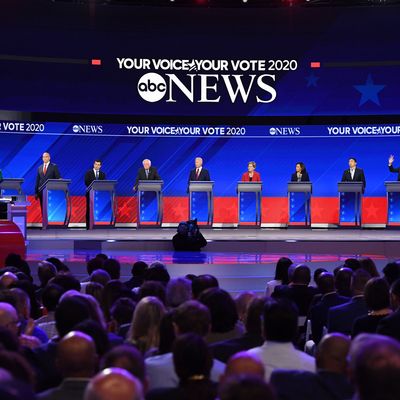
After the two earlier rounds of Democratic presidential debates, there were occasional “snap” polls or focus groups or shaky online surveys that gave a sense of who did and did not do well. But before and after the third debate in Houston last week, FiveThirtyEight and the polling firm Ipsos tried to get a more rigorous measurement of what the debate changed (if anything), in part by putting together separate samples of debate watchers and non-watchers. Laura Bronner and Nathaniel Rakich provide some key findings:
The final numbers from our poll with Ipsos are in, and the big takeaway is that the third Democratic presidential debate didn’t seem to have a big effect on voters’ views of the primary. Ipsos interviewed the same group of likely Democratic primary voters twice — before and after the debate — and the poll found that the share of respondents who said they were considering voting for each candidate largely remained the same….
If the debate had a winner, it probably was Sen. Elizabeth Warren. Although the share of voters who were considering supporting her went up by only 2.4 percentage points, it was the biggest increase in the field. She was also the only one of the top three candidates to gain potential supporters; former Vice President Joe Biden and Sen. Bernie Sanders both lost ground.
Beto O’Rourke, Cory Booker, and Amy Klobucher seem to have benefited modestly from the debate, while Kamala Harris marginally lost ground. On the night of the debate, it was generally thought that Julián Castro might have hurt himself with the way he went about criticizing Joe Biden’s age, and the FiveThirtyEight/Ipsos poll reflected that:
[F]ormer Secretary of Housing and Urban Development Julián Castro, who has struggled to break out, may have landed himself in jeopardy. Castro had the biggest drop in net favorability rating (it dropped 10 points) and received the lowest marks for his debate performance.
If the debate didn’t produce major changes, it affected those who watched it significantly more than those who just heard or read about it subsequently:
[D]ebate watchers developed more positive feelings toward just over half the field, including O’Rourke; businessman Andrew Yang saw a small drop, though not nearly as large as Castro’s, and Sanders and Harris saw little change. However, among non-watchers there was far less movement. Their opinions changed by more than a point for only three candidates — Warren, Booker and Castro — with Warren the only one who improved her standing in their eyes. Castro had the biggest drop here too, but Booker also decreased in the estimation of non-watchers, which is a little odd, considering he had the second-biggest boost in his net favorability ratings among those who watched the debate.
Both objective and subjective reactions suggest that the Houston debate confirmed the earlier trajectory of the race: Warren has been the “It” candidate for a good while now, and candidates outside the Big Three of Biden, Warren, and Sanders continue to struggle. The next debate (or debates) in mid-October could produce a greater sense of urgency, more candidate risk-taking, and perhaps some real change in the contest’s dynamics — or at least in the size of the field.






























